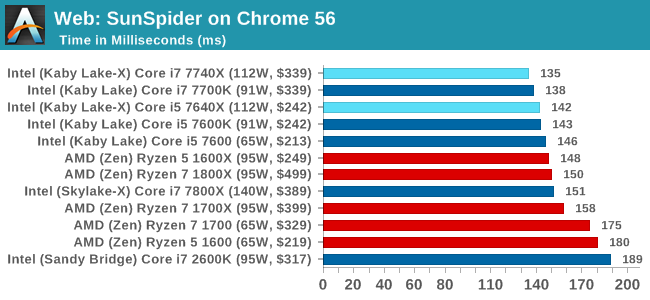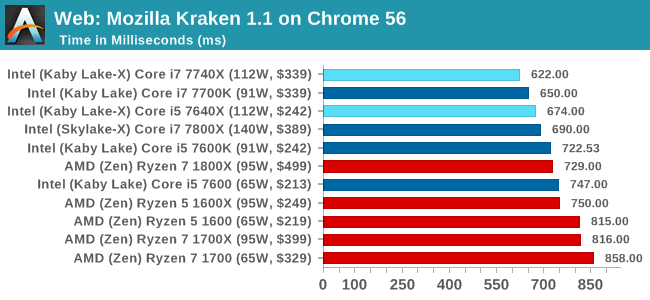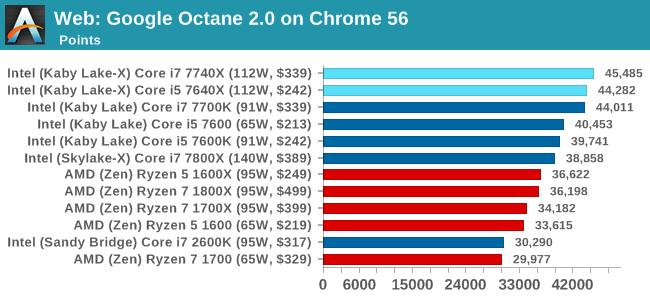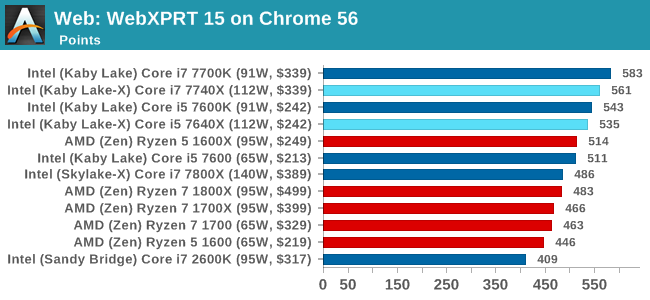The Intel Kaby Lake-X i7 7740X and i5 7640X Review: The New Single-Threaded Champion, OC to 5GHz
by Ian Cutress on July 24, 2017 8:30 AM EST- Posted in
- CPUs
- Intel
- Kaby Lake
- X299
- Basin Falls
- Kaby Lake-X
- i7-7740X
- i5-7640X
Benchmarking Performance: CPU Web Tests
One of the issues when running web-based tests is the nature of modern browsers to automatically install updates. This means any sustained period of benchmarking will invariably fall foul of the 'it's updated beyond the state of comparison' rule, especially when browsers will update if you give them half a second to think about it. Despite this, we were able to find a series of commands to create an un-updatable version of Chrome 56 for our 2017 test suite. While this means we might not be on the bleeding edge of the latest browser, it makes the scores between CPUs comparable.
All of our benchmark results can also be found in our benchmark engine, Bench.
SunSpider 1.0.2: link
The oldest web-based benchmark in this portion of our test is SunSpider. This is a very basic javascript algorithm tool, and ends up being more a measure of IPC and latency than anything else, with most high-performance CPUs scoring around about the same. The basic test is looped 10 times and the average taken. We run the basic test 4 times.

SunSpider has a single threaded focus, and we see the Kaby Lake-X processors take their spots at the top of the graph.
Mozilla Kraken 1.1: link
Kraken is another Javascript based benchmark, using the same test harness as SunSpider, but focusing on more stringent real-world use cases and libraries, such as audio processing and image filters. Again, the basic test is looped ten times, and we run the basic test four times.

Mozilla too relies on single threaded IPC and frequency.
Google Octane 2.0: link
Along with Mozilla, as Google is a major browser developer, having peak JS performance is typically a critical asset when comparing against the other OS developers. In the same way that SunSpider is a very early JS benchmark, and Kraken is a bit newer, Octane aims to be more relevant to real workloads, especially in power constrained devices such as smartphones and tablets.

Octane is an interesting benchmark, requiring cores and ST performance, but mostly the latter. It also seems that either Intel's design is optimized for the benchmark or vice versa, given the substantial difference in performance. There's no way for the benchmark to use all of the threads from AMD, nor the 12 threads in the Core i7-7800X which has a lower single thread performance.
WebXPRT 2015: link
While the previous three benchmarks do calculations in the background and represent a score, WebXPRT is designed to be a better interpretation of visual workloads that a professional user might have, such as browser based applications, graphing, image editing, sort/analysis, scientific analysis and financial tools.

WebXPRT is a mix of ST and MT, but still based in the web and relies on ST performance a lot. Given the variable loading on the benchmark, Intel's newest features such as Speed Shift help keep it at the top.










176 Comments
View All Comments
YukaKun - Monday, July 24, 2017 - link
Hat off to you, Mr Ian. A lot of good and interesting information there.Cheers!
Ian Cutress - Monday, July 24, 2017 - link
Thanks :) This will hopefully become the new CPU testing standard for us. It's all scripted, making benchmarking relatively easy. Sourcing and writing are now the mentally consuming parts.YukaKun - Monday, July 24, 2017 - link
That is nice to know. Will you write an article about the testing itself? Like detailing the process or something along those lines? It would be interesting to know about those little details, for sure!I'm sure you can glue together an article in no time! *wink wink*
Ian Cutress - Monday, July 24, 2017 - link
I've had one half-written about the new 2017 suite and an upcoming project for a couple of weeks. Need to get on it! Coffee time...Dr. Swag - Monday, July 24, 2017 - link
Let's hope you won't be Lake to the party...Cellar Door - Monday, July 24, 2017 - link
What is lake to the party is Intel - it is just so firetrucking sad how they refuse to give customers more for their money. HT should be enabled on all their chips, it is there on the physical chip.I will never buy another Intel cpu - what! You got a problem with that Intel?
leexgx - Monday, July 24, 2017 - link
Ryzen on some r3 cpus don't have SMTLolimaster - Tuesday, July 25, 2017 - link
With the corresponding price, Ryzen 1500X 4c/8t is 90% of the i7 7700 for half the price.Dr. Swag - Tuesday, July 25, 2017 - link
"With the corresponding price, Ryzen 1500X 4c/8t is 90% of the i7 7700 for half the price."This is just incorrect. Ryzen ipc is around 90% of kaby/skylake, but the 7700k oces around 25% higher and also has around a 20% higher out of the box frequency.
Diji1 - Wednesday, July 26, 2017 - link
Uh oh, now they have to swear to never buy an AMD chip ever ever!